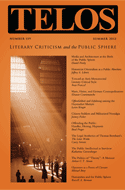Arthur C. T. Strum’s “The Politics of ‘Theory’ in a Late Twentieth-Century University: A Memoir” appears in Telos 159 (Summer 2012). Read the full version online at the Telos Online website, or purchase a print copy of the issue here.
 In this essay, I explore my own experience as an undergraduate of two formations. One of these formations might be called “liberal pedagogy,” by which I mean something which its practitioners do not in the rule consciously profess, but which underlies their everyday practice, in and out of the classroom. The other formation is what denizens of the American university have for the past thirty years commonly called “theory,” whose adherents tended to define themselves against what they saw and see as the self-deceptions of liberal thought. I contend, against both the “theorists” and the university’s liberal defenders, that liberal pedagogy is in fact deeply political—far more profound, politically, than most “theory,” which tends not to get very far beyond what it thinks it contests: the structuring prejudices of present-day civil society. But I also try to show that the inclination towards “theory” has its own political profundity—whose ultimate implications, however, are ambiguous.
In this essay, I explore my own experience as an undergraduate of two formations. One of these formations might be called “liberal pedagogy,” by which I mean something which its practitioners do not in the rule consciously profess, but which underlies their everyday practice, in and out of the classroom. The other formation is what denizens of the American university have for the past thirty years commonly called “theory,” whose adherents tended to define themselves against what they saw and see as the self-deceptions of liberal thought. I contend, against both the “theorists” and the university’s liberal defenders, that liberal pedagogy is in fact deeply political—far more profound, politically, than most “theory,” which tends not to get very far beyond what it thinks it contests: the structuring prejudices of present-day civil society. But I also try to show that the inclination towards “theory” has its own political profundity—whose ultimate implications, however, are ambiguous.


